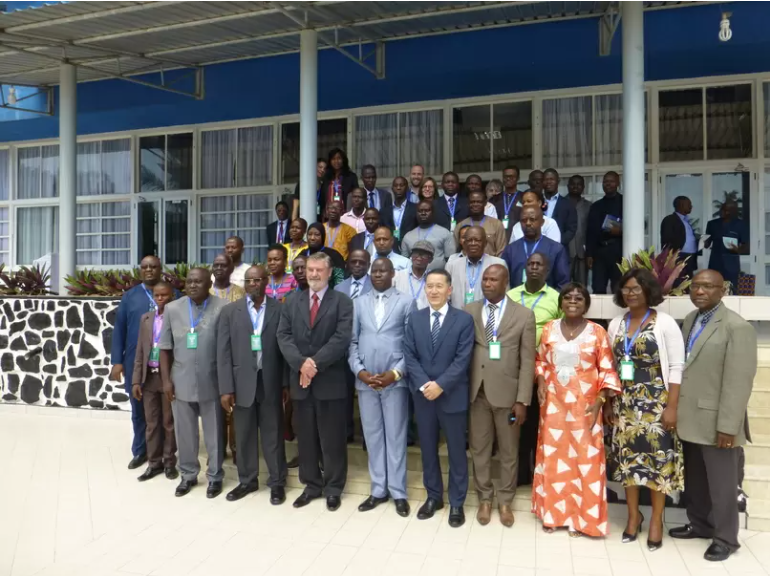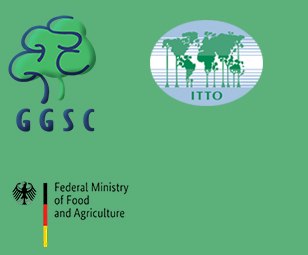
If a smallholder has capital for a modest investment and technical support, tree plantations and woodlots can work as a “tree bank” offering secured interest and acting as a personalized “pension fund”.
This was one of the themes to emerge at the Regional Workshop on Promotion of Smallholders Forest Landscape Restoration in West Africa, which opened on 27 November 2019 at Hotel Ecole le Bénin in Lomé, Togo. The workshop was convened by ITTO in cooperation with Togo’s Office for the Development and Logging of Forests (ODEF) and Ministry of Environment, Sustainable Development and Nature Protection. It took place under ITTO’s Legal and Sustainable Supply Chains (LSSC) programme, which is financed by the German Federal Ministry of Food and Agriculture (BMEL).
The workshop was attended by about 50 people from government, the private sector and civil society in the following ITTO African member countries: Benin, Cameroon, the Central African Republic, Côte d'Ivoire, the Democratic Republic of the Congo, the Congo, Gabon, Ghana, Liberia, Mali, Madagascar, Mozambique and Togo. Representatives of bilateral and multilateral partners also joined the workshop.

Participants in the Regional Workshop on Promotion of Smallholders Forest Landscape Restoration in West Africa, held in Lomé, Togo, on 27 November 2019. Photo: Mélanie Feurer
Speaking at the workshop opening, ODEF Director-General Mr Pyoabalo Alaba said that forest landscape restoration (FLR) is essential for addressing climate change, conserving biodiversity and ensuring the sustainability of life on land. He said his government is committed to FLR under the Bonn challenge initiative, and he appreciated ITTO’s support for the workshop.
John Leigh, Chairperson of the International Tropical Timber Council, which will convene in Lomé next week in its 55th session, said the international community has set ambitious goals for FLR, including restoring 150 million hectares by 2020 in the framework of the Bonn Challenge and 350 million hectares by 2030 under the New York Declaration on Forests. Moreover, the United Nations General Assembly has declared 2021–2030 the UN Decade on Ecosystem Restoration.
Mr Leigh said he was pleased that, based on the lessons learned from the implementation of the ITTO guidelines on forest restoration published in 2002, the new draft FLR guidelines prepared by Professor Jürgen Blaser and Dr Cesar Sabogal would be presented at next week’s Council session.
Repairing our damaged landscapes at the scale needed will require an immense effort, said Mr Leigh.
“The multiple values of FLR must be further recognized, quality plantations need to be established and managed, sustainable value chains need to be developed, local communities and entrepreneurs have to be enabled, market opportunities have to be expanded and investments should be increased,” he said.
Professor Blaser, from Switzerland’s Bern University of Applied Sciences, said that land use was highly dynamic in West Africa, with occupation and use changing on more than 90% of the land area in recent years.
“Smallholders can play an important role as a driving force for sustainable FLR development in West Africa,” he said.
In his opening statement delivered on behalf of the Minister of Environment, Sustainable Development and Nature, Secretary General Mr Koffi Aoufo Dimizou said that Togo FLR strategies have encouraged collaborative systems between small producers based on private and community initiatives, covering the entire supply and value chains, from the forest to the market. He stressed that, in addition to their own national efforts, West African countries need support from bilateral and multilateral cooperation. He welcomed ITTO’s instigation of the workshop as a means to exchange best practices among stakeholders for the revitalization and health of the region’s forest landscapes.
The workshop’s background paper is available here (in English and French).

| E-mail:ggsc@itto-ggsc.org | Tel:86-10-62888626 |


Sigh Up for Emails |
|